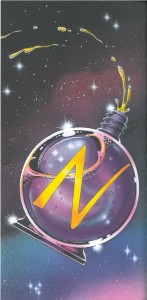Written by guest blogger, Kathryn Imray.
Rorschach is the character I appreciate least in Alan Moore and Dave Gibbon’s Watchmen,* and I begrudgingly included him in my article for the Journal of Religion and Popular Culture on theodicies in Watchmen. To summarize my argument there, Rorschach represents the position that evil, and the suffering it entails, is a product of human behaviour. For Rorschach, an indifferent God creates an abyss in which this human evil thrives, and into which he imposes his own moral system. Rorschach’s moral system is, I argue, a “monstrous, black-and-white, neo-fascist retributive justice.”
As I wrote about Rorschach, I wondered where this moral system came from, for it is certainly not the only possible response to a meaningless universe. My mind returned repeatedly to a bottle of perfume peppered throughout the narrative, Nostalgia by Veidt (See IMAGE 1), and the impact of that symbol on the lives of the characters, who all long for something from the past. Veidt longs for the wisdom of the ancient Egyptians. Dan longs for sexual adequacy, and gets it back when he puts on his old costume. The elderly Sally Jupiter has a bottle of Nostalgia on her dressing table (8:1), and longs for her lost love, her rapist, Eddie Blake. She gives voice to this nostalgia:
“Every day the future looks a little bit darker. But the past, even the grimy parts of it, well, it just keeps getting brighter all the time” (2:4).
Her daughter, Laurie, carries a bottle of Nostalgia in her hand bag (9:21). This image overlaps that of the snowglobe she owned as a girl, “a little glass bubble of somewhere else” (9:7; 9:24). When she smashes the snowglobe, and the bottle of Nostalgia, they were not filled with a “different sort of time” after all, but only with water (9:8; 9:24). This longed-for past, then, this “different sort of time” (9:7; 9:24), is make-believe.
Rorschach longs for the values of post-WWII America, and one can imagine he would be heartened by Donald Trump’s call to “Make America Great Again.” When he walks along the street, “Women’s breasts [are] draped across every billboard . . . Was offered Swedish love and French love but not American love. American love; like Coke in green glass bottles, they don’t make it anymore” (2:25). His idols are good men, decent men, like his father and President Truman, “who believed in a day’s work for a day’s pay” (1:1). Like Laurie, Rorschach is looking into a snowglobe of childish make-believe. In his youth he wrote an essay on the father he never met, whose name was ‘charlie’ (with a lower case c), no last name, kicked out by Rorschach’s mother because he was a big supporter of Truman. He likes Truman because his father would have wanted him to, and because he believes it was a good thing to drop the atomic bomb on Japan. His father never claimed him, the young Rorschach says, because he was probably killed defending his country, fighting the Nazis (unnumbered page between chapters 6 and 7).
*All references are to the chapter and page in Alan Moore and David Gibbons, Watchmen (Absolute Watchmen), New York: DC Comics, 2005. All images shown are from that edition of the graphic novel.
Kathryn Imray’s article, “Shall Not the Judge of All the Earth Do Right? Theodicies in Watchmen”, is available to read in the latest issue of the Journal of Religion and Popular Culture, Vol. 29, Issue 2 (2017).

{ 1 trackback }
Comments on this entry are closed.